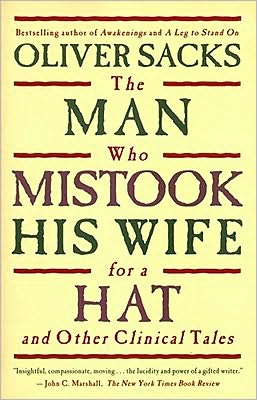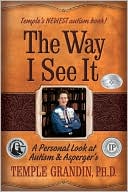The Man Who Mistook His Wife for a Hat
In his most extraordinary book, "one of the great clinical writers of the 20th century" (The New York Times) recounts the case histories of patients lost in the bizarre, apparently inescapable world of neurological disorders. Oliver Sacks's The Man Who Mistook His Wife for a Hat tells the stories of individuals afflicted with fantastic perceptual and intellectual aberrations: patients who have lost their memories and with them the greater part of their pasts; who are no longer able to...
Search in google:
In his most extraordinary book, "one of the great clinical writers of the 20th century" (The New York Times) recounts the case histories of patients lost in the bizarre, apparently inescapable world of neurological disorders. Oliver Sacks's The Man Who Mistook His Wife for a Hat tells the stories of individuals afflicted with fantastic perceptual and intellectual aberrations: patients who have lost their memories and with them the greater part of their pasts; who are no longer able to recognize people and common objects; who are stricken with violent tics and grimaces or who shout involuntary obscenities; whose limbs have become alien; who have been dismissed as retarded yet are gifted with uncanny artistic or mathematical talents. If inconceivably strange, these brilliant tales remain, in Dr. Sacks's splendid and sympathetic telling, deeply human. They are studies of life struggling against incredible adversity, and they enable us to enter the world of the neurologically impaired, to imagine with our hearts what it must be to live and feel as they do. A great healer, Sacks never loses sight of medicine's ultimate responsibility: "the suffering, afflicted, fighting human subject." New York Magazine Dr. Sacks' most absorbing book... His tales are so compelling that many of them serve as eerie metaphors not only for the condition of modern medicine but of modern man.
Preface PART ONE: LOSSES Introduction 1 The Man Who Mistook His Wife for a Hat 2 The Lost Mariner 3 The Disembodied Lady 4 The Man Who Fell out of Bed 5 Hands 6 Phantoms 7 On the Level 8 Eyes Right! 9 The President's Speech PART TWO: EXCESSES Introduction 10 Witty Ticcy Ray 11 Cupid's Disease 12 A Matter of Identity 13 Yes, Father-Sister 14 The Possessed page PART THREE: TRANSPORTS Introduction 15 Reminiscence 16 Incontinent Nostalgia 17 A Passage to India 18 The Dog Beneath the Skin 19 Murder 20 The Visions of Hildegard PART FOUR: THE WORLD OF THE SIMPLE Introduction 21 Rebecca 22 A Walking Grove 23 The Twins 24 The Autist Artist Bibliography
\ Kirkus ReviewsIf you enjoy medical case histories that are sensitive yet lively, weird but informative, then Sacks' book is your ticket. A neurologist who writes with wit and zest, he will fascinate you with stories of patients like the man in the title--a professor who couldn't recognize faces and who patted the tops of fire hydrants believing them to be children. Nietschze asked whether we could do without disease in our lives and the author explores this interesting concept with a rare and invigorating philosophic sense. Sacks is no ordinary practitioner; his patients suffer from rare complaints like Korshakov's syndrome, Tourette's and other afflictions, some of which make the patient unsure of the reality of his own body. Their tragedies and their courage are joined with the author's astute professionalism and humanity to make for a riveting foray into the unknown. The history of these strange cases and the state of the art of medicine are deftly probed. Yet in the midst of all this tragedy, there is an eerie comic quality. Take the 80-year-old ex-prostitute who discovers a new liveliness and euphoria, which she enjoys immensely. However, the reason for this is a recurrence of an old syphilis infection. Does she want to be totally cured and lose this new found ebullience? Not really. She relishes "Cupid's disease's" strange excitation of her cerebral cortex too much. To Sacks' credit, he agrees with her. This book ranks with the very best of its genre. It will inform and entertain anyone, especially those who find medicine an intriguing and mysterious art.\ \ \ \ \ New York MagazineDr. Sacks' most absorbing book... His tales are so compelling that many of them serve as eerie metaphors not only for the condition of modern medicine but of modern man.\ \ \ New York MagazineDr. Sacks' most absorbing book... His tales are so compelling that many of them serve as eerie metaphors not only for the condition of modern medicine but of modern man.\ \







